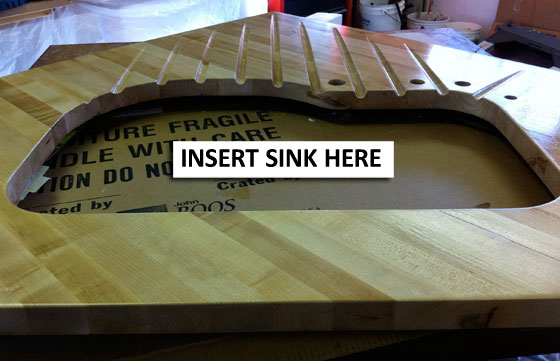Repetition makes the necessary physical moves automatic, freeing the brain to make good decisions.
I’ve tried to apply that to fiction writing, putting in the hours at my desk even when it was a struggle, believing that made me a “professional.” But recently I’ve realized that an indirect approach works even better.
The past few weeks, I’ve balanced my desk time with a project in our workshop: building a new kitchen counter. This represents many firsts: the first time working with butcherblock. The first time building a counter from scratch. And most significantly, the first time my husband and I have ever attempted a home improvement project together.
We’re entering the home stretch, and we’re still married—though the hubs did recently decamp for FL. I like to think it’s got nothing to do with our project… but who knows. What I do know is that working with my hands again has actually helped me work better with my brain.
Fiction writing is like no other pursuit. Yes, we need the same skills as journalists and editors, because our stories will be wasted if our words make no sense. But that wordcraft will be wasted without our imaginations, which (if we’re lucky) create memorable characters and the rich, detailed worlds in which they live.
The products of our imagination are most visible when looked at indirectly. It’s kind of like seeing in the dark; peripheral vision is the best way to see something that’s bubbling up out of nowhere. Direct focus (like direct sunlight) will often scare away an idea before it’s had a chance to solidify.
Exercise has always helped me write; a walk, run, or bike ride clears the countertop of my mind, allowing ideas to percolate up to the surface. If I’m lucky, I grab them before they sink out of sight again.
Hands-on projects like building a new counter seem to offer a similar benefit. While I’m trying to figure out what radius would look best on the edge of a cutout for the undermount sink, my imagination is percolating. New characters, fresh scenes, tiny word changes that sharpen the conflict—I never know what might sneak in while I’m actively thinking about something else.
Perhaps there’s something else going on here too. Fellow author Roberta Gately claims that having a real job (as an ER nurse in Boston) keeps her grounded, making her fiction more real. Could it be that fitting in writing around real life actually makes the writing more real?
It seems to work that way for me.
And if you’re wondering about those grooves in the counter, they’re called “runnels.” Perhaps a combination of “rain” and “tunnel.”
